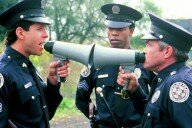As I walked out of Pugh Hall and into the rainy, dreary Monday night, I was consumed by two thoughts.
- 1. Toms are the worst shoes to ever get caught in the rain with. (Imagine having to walk all over campus wearing really thick, wet socks. Gross.) and
- 2. I wish I had never given up playing piano.
The first thought was obvious, considering the weather. The second thought, however, was quite random, considering I had just heard Howell Raines, former executive editor of The New York Times discuss his experiences in journalism.
Judging by audience reactions and tweets, most people were up in arms with his comments about print journalism being a dying industry. (Gasp! People aren’t reading newspapers anymore?!) He threw out facts and figures on print publication revenue decline and the challenges of journalism transitioning to a digital world.
Former #NYT executive editor’s advice to aspiring #journalists: Look at the numbers. Way to crush dreams #depressing twitter.com/hanaengroff/st…
— Hana Engroff (@hanaengroff) February 25, 2013
Interesting, yes, but not all that surprising.
Unlike some of the other members in the audience, what Raines said that struck me the most didn’t have much to do with the future of journalism at all.
When asked what it was like leaving the position as executive editor and what came next, Raines simply said that he enjoyed that while it lasted, but once it was over he decided to explore other interests.
You mean after holding such a prestigious title and being at the top of the journalism world, he simply moved on to other things? He focused on fly-fishing and writing fiction novels? Preposterous!
As college students we have mastered an epic paradox. We have been trained to have a one-track mind, but appear to the world as if we are a well-rounded Renaissance man.
We have our one (or two, for you over-achievers) declared major and all of our time, energy and effort is invested in pursuing solely that, but at the same time, we pad the resume with student organizations and research and community service to make it seem as if we are pursing interests all over the map.
What if your “declared” strong suit doesn’t work out? I guarantee Raines didn’t anticipate being fired from the New York Times after a little under two years in the position.
You can’t plan exactly how life will unfold. Life is unpredictable and messy and sometimes you need to be prepared for, well, things you weren’t formally trained to be prepared for.
What do you have to fall back on? You may get the chance to experiment with your other interests one day and if you’ve let them all dissipate because you’ve only focused on fostering your official life plan, you’ll never adapt to the unfolding of life.
Were you a history buff as a kid? Good at drawing comics? Writing poetry? Camping? Playing an instrument? Salsa dancing?
Whatever your interests are, don’t let them disappear because they don’t seem “practical” or “marketable” right now.
Keep those things that you are passionate about just as prominent and regular in in your life as you do your weekly Study Edge reviews.
I gave up playing piano when I was younger because I didn’t feel like it was going anywhere and other things seemed more important. Will I be a famous pianist one day? Probably not, but the option will always exist if I keep the music in my life.
Unlike most, hearing Raines speak didn’t crush my dreams of being a journalist. If anything, it inspired me to remember that I am so much more than a journalist.
So, I came home, threw my Toms in the dryer and the next day snuck into the music building to see if the piano and I could reunite after all these years. Because who knows what the future holds?

UF School Of Music
(Photo of Howell Raines: @MyCJC)





